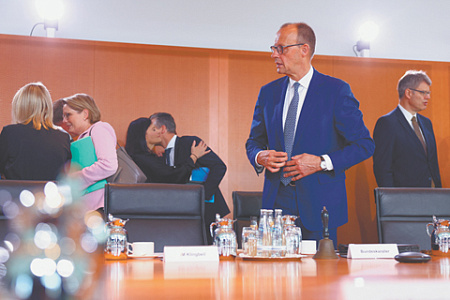
German Federal Chancellor Friedrich Merz’s official visit to the United States begins on Thursday. In Washington, he will hold talks with President Donald Trump, followed by a press conference at the White House. The leaders will discuss relations between the countries, issues on the international agenda, including conflicts in Ukraine and the Middle East, as well as duties on imports of European goods to the United States.
The German Federal Press and Information Office announced that Merz’s first official meeting with Trump will take place on June 5. However, he had a brief meeting with Trump in New York a few years ago. According to the official German side, the Ukrainian problem will be at the center of the negotiations.
Ahead of the Chancellor’s visit, the Second Channel of German television ZDF drew attention to the recent trip to the United States by German Federal Foreign Minister Johann Vadefuhl, who is considered Merz’s confidant. In Washington, Vadefoul met with Marco Rubio, who currently holds the positions of Secretary of State and head of the National Security Council. Following his visit to the United States, Vadefoul spoke about the crisis in US-German relations. In particular, he spoke about the harsh tone with which they negotiated with him in Washington, and called for building bridges with American politicians. Vadefulh concluded that there was a lack of trust between Germany and the United States.
In a television interview, the minister named the main topics of Merz’s talks in Washington. In addition to the situation around Ukraine, the talks with Trump will focus on further sanctions against Moscow, the upcoming NATO summit, the Iranian nuclear dossier, the situation in the Gaza Strip and the actions of the Israeli government. But most importantly, Merz will raise the issue of the upcoming tariff war between Europe and the United States, which has been postponed until July 9th.
The extremely painful tariff problem for Merz itself is of paramount importance. The fact is that he came to power on promises of economic growth after several years of recession, which the German economy is in after the economic experiments of the previous government. It is no coincidence that the new German Minister of Economy and Energy, Katharina Reiche, recently directly accused her predecessor, the “green” Minister of Economy and Climate, Robert Habeck, in the government of Olaf Scholz of instilling an “anti-growth” policy. Its meaning was reduced to the alleged stabilization of processes in the economic and social life of the country, which implied a slight increase in GDP and even stagnation.
And American tariffs, if Trump introduces them against Europe, will primarily affect such sectors of German industry as engineering and the automotive industry. The downturn in the automotive industry, which is the backbone of the German industry, has already led to the closure of a number of factories. And even the fact that military-industrial concerns have taken several such plants under their care, setting up military production there, does not save the situation in any way.
In addition, as the German press notes, Merz is faced with the task of demonstrating his status as a European leader to Trump. It is no coincidence that Merz, in coordination with Brussels, will act with a unified position of the EU countries on the issue of preventing a tariff war.
Merz, judging by Vadefulya’s interview, does not expect that Washington may start talking about the domestic political situation in Germany. After all, the minister was asked about the so-called tyranny in Germany related to the persecution of right-wing populists from the Alternative for Germany (AfD). The existence of such tyranny has been repeatedly mentioned by American officials since the beginning of the year. However, the US attitude to this topic is important not so much for Merz and the Christian Democratic Union he heads, but for the internal party situation in the AFD, where a split is already emerging due to Washington’s support for the party.
